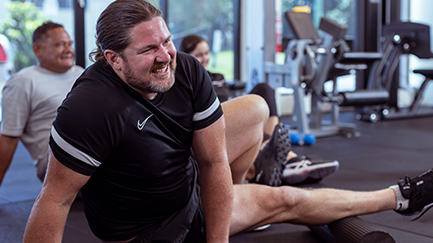
Supporting veterans through service related injuries
The Mates4Mates physical rehabilitation team is here to help veterans improve mobility, manage pain and enhance their overall wellbeing.

When transitioning out of the Defence Force, veterans can experience a range of health and wellbeing changes for a variety of reasons. A common challenge is managing metabolic conditions.
What is a metabolic condition?
Metabolic conditions are disorders that affect how the body converts food into energy. They often involve problems with blood sugar regulation, cholesterol, blood pressure and body weight. The most common examples include type 2 diabetes, obesity, metabolic syndrome and cardiovascular disease.
Among veterans, these conditions are more prevalent due to a combination of factors such as changes in physical activity after service, chronic stress, sleep disruption, medication side effects and injuries that limit mobility.
Transitioning out of the structured, physically demanding lifestyle of the military can also make it challenging to maintain healthy habits, leading to gradual metabolic decline, according to research.
The impact on overall health
Metabolic conditions can have widespread effects on the body. They can lead to:
Over time, these issues can limit independence and reduce quality of life. Early management is key to preventing long-term complications.
The benefits of exercise
Exercise is one of the most effective tools for managing metabolic conditions. Regular physical activity helps by:
Both aerobic exercise (like walking, cycling or swimming) and resistance training (using weights or bodyweight exercises) play important roles. Physiotherapists and exercise physiologists can tailor safe, progressive programs that fit a veteran’s current fitness, injury history and health goals.
Simple ways to be more active
Small, consistent changes can make the biggest difference. Veterans looking to include more physical activity in their daily lifestyle can:
If you feel like you need extra support to get started, reaching out to an exercise professional can be a good first step.
Support at Mates4Mates
Mates4Mates provides tailored physiotherapy and exercise physiology programs designed to help veterans manage and improve their physical health.
These programs focus on safe, evidence-based exercise interventions to reduce the impact of chronic conditions, improve mobility and enhance overall wellbeing.
In addition, Mates4Mates offers a supportive environment within Veteran & Family Wellbeing Centres where veterans can connect with others, access education around healthy lifestyles, and receive guidance on building sustainable habits for long-term health.
To find out more about how Mates4Mates can help support your metabolic conditions and general health and wellbeing, reach out to us on 1300 4 MATES (62 837) for a confidential chat.
Written by Baxter Mahutonga, Mates4Mates Clinical Lead – Physical Rehabilitation & Wellbeing and Physiotherapist

The Mates4Mates physical rehabilitation team is here to help veterans improve mobility, manage pain and enhance their overall wellbeing.